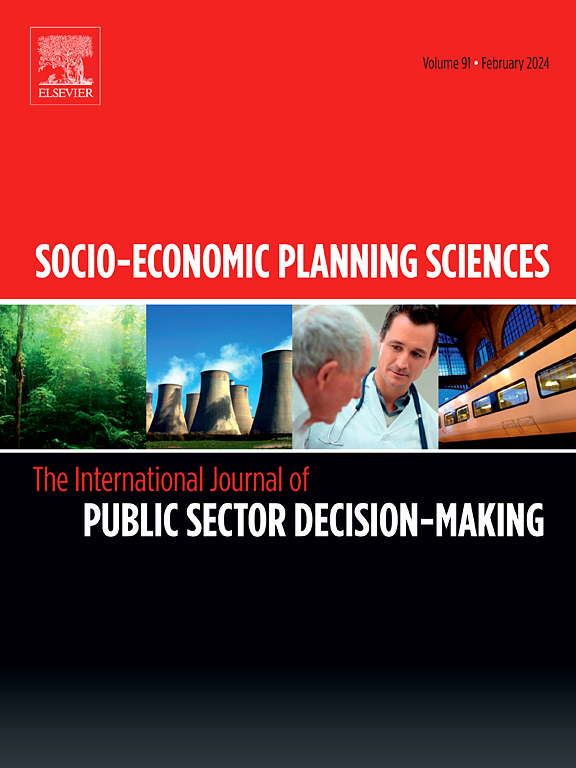Impact of family members’ perception bias on service strategies of elder care institutions
IF 6.2
2区 经济学
Q1 ECONOMICS
引用次数: 0
Abstract
Family members play an important role in the decision-making process of the elderly in accepting elder care services, which inevitably influences the operational strategy of elder care institutions (ECIs). Previous literature has focused on the disagreements between the elderly and their family members, but a research gap remains in examining the effects of family members' perception bias on ECIs' decisions to outsource service and on the elder care service market in general. Our study bridges this gap by employing a game-theoretic model that incorporates monopoly and duopoly markets to explore these effects. Our findings indicate that family members' perception bias for ECIs' services negatively impacts ECIs' prices, demand, and profit. Moreover, we find that in the monopoly market, an ECI should adopt the outsourcing strategy to reduce losses if family members' perception bias is higher. In the duopoly market, when family members' perception bias is higher, if one ECI adopts the outsourcing strategy, then the other ECI should opt for the self-providing strategy, and vice versa. Furthermore, we observe that a higher perception bias decreases family surplus and social welfare in the monopoly market. However, it may sometimes benefit family surplus and social welfare in the duopoly market. Our results offer insightful takeaways for ECIs' operational strategies and policymakers’ welfare policies in the elder care service market.
家庭成员感知偏差对养老机构服务策略的影响
家庭成员在老年人接受养老服务的决策过程中起着重要的作用,这必然影响到养老机构的经营策略。以往的文献主要关注老年人与家庭成员之间的分歧,但在研究家庭成员的感知偏见对eci外包服务决策和总体养老服务市场的影响方面仍然存在研究空白。我们的研究通过采用博弈论模型来探讨垄断和双寡头垄断市场的影响,从而弥补了这一差距。研究结果表明,家庭成员对幼儿园服务的感知偏差对幼儿园的价格、需求和利润产生负向影响。此外,我们发现在垄断市场中,当家庭成员的感知偏差较高时,ECI应采取外包策略以减少损失。在双寡头市场中,当家族成员的感知偏差较高时,如果一个企业成员采取外包策略,那么另一个企业成员应该选择自备策略,反之亦然。此外,我们观察到,在垄断市场中,较高的感知偏差会降低家庭剩余和社会福利。然而,在双寡头市场中,它有时也有利于家庭剩余和社会福利。我们的研究结果为养老服务市场中养老机构的运营策略和政策制定者的福利政策提供了有见地的启示。
本文章由计算机程序翻译,如有差异,请以英文原文为准。
求助全文
约1分钟内获得全文
求助全文
来源期刊

Socio-economic Planning Sciences
OPERATIONS RESEARCH & MANAGEMENT SCIENCE-
CiteScore
9.40
自引率
13.10%
发文量
294
审稿时长
58 days
期刊介绍:
Studies directed toward the more effective utilization of existing resources, e.g. mathematical programming models of health care delivery systems with relevance to more effective program design; systems analysis of fire outbreaks and its relevance to the location of fire stations; statistical analysis of the efficiency of a developing country economy or industry.
Studies relating to the interaction of various segments of society and technology, e.g. the effects of government health policies on the utilization and design of hospital facilities; the relationship between housing density and the demands on public transportation or other service facilities: patterns and implications of urban development and air or water pollution.
Studies devoted to the anticipations of and response to future needs for social, health and other human services, e.g. the relationship between industrial growth and the development of educational resources in affected areas; investigation of future demands for material and child health resources in a developing country; design of effective recycling in an urban setting.
 求助内容:
求助内容: 应助结果提醒方式:
应助结果提醒方式:


